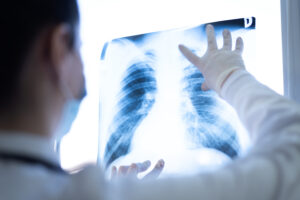 Lung cancer is the second most common cancer in the United States, reports the American Cancer Society (ACS). It states that in 2022, there will be an estimated 236,740 new lung cancer cases and that this will cause 130,180 deaths.
Lung cancer is the second most common cancer in the United States, reports the American Cancer Society (ACS). It states that in 2022, there will be an estimated 236,740 new lung cancer cases and that this will cause 130,180 deaths.
Lung cancer screening can help you identify cancer in its early stages to increase treatment options and improve your chances of experiencing a positive outcome. Here’s more about how lung cancer screening works and why you should consider having one.
Why Screen for Lung Cancer?
Lung cancer does not usually present any symptoms until later stages, when many treatment options are no longer available. The goal of lung cancer screening is to detect disease at an early stage, thus increasing the likelihood of cure.
Smoking is the number one risk factor for lung cancer and is responsible for an estimated 80% of deaths caused by this disease. Other risk factors for lung cancer include secondhand smoke and exposure to toxins such as radon, asbestos, and diesel exhaust.
The screening test for lung cancer requires no preparation, no downtime, and takes only a few minutes to perform.
What Is Lung Cancer Screening?
Lung cancer screening is an imaging test that can help you and your doctor catch lung cancer early. If you can catch this disease before it spreads, your likelihood of surviving five years or longer improves to 60%.
Screening for lung cancer is generally recommended for older adults who have been smoking for a long time and do not have any signs or symptoms of lung cancer.
People who should consider having a lung cancer screening include:
Talk to your doctor to learn more about whether lung cancer screening is ideal for you based on your current health status and medical history.
What To Expect From Lung Cancer Screening
Appointments for lung cancer screening usually last under 30 minutes. The test requires little preparation, though you may be asked to remove any metal you are wearing to prevent it from interfering with the imaging.
During the Screening
First, you will lie on your back on a table. You will be asked to lie very still as the table slides through the center of a large imaging machine that creates pictures, or images, of your lungs. Moments before the machine starts scanning your body, the technician will ask you to hold your breath for short periods at a time, which will help the images display more clearly.
The actual scan usually takes less than one minute to perform.
After the Screening
Lung cancer screening produces no downtime—meaning you can resume your normal activities immediately after your appointment. Your doctor will review the images of your lungs and contact you to discuss your results when ready.
Further recommendation will depend on the results of the screening and can range from continued yearly screening, shorter interval follow-up with CT scan or another test, or surgical opinion.
It is highly recommended that follow-up testing is performed at the same facility as comparison to previous year testing is important.
Thoracic Group specializes in the diagnosis, treatment, and management of conditions that affect the lungs, including lung cancer. Request an appointment with us today to schedule a lung cancer screening and to learn more about our healthcare services.